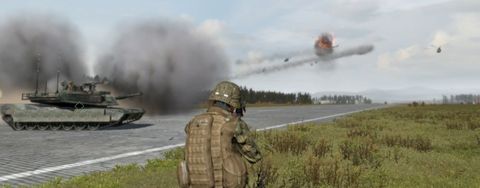Our Verdict
A must-have collection for anyone looking for something more ambitious than just a military shooter.
PC Gamer's got your back
Arma is not like other shooters. You're playing soldiers in a game that begat a military training simulator. You can move your head independently to your body. You can see for kilometres. You have to worry about bullet drop, squad positioning, light conditions and goats.
Arma has been like this for ten years. Its developers, Bohemia, have always resisted the urge to smooth out the experience, instead adding more layers of complexity.
If you want easy, simple or even a fully working game, look elsewhere. Arma X: Anniversary Edition is every game in Bohemia Interactive's Armary (they cruelly didn't take the opportunity to call it that). They've rescued 2001's Operation: Flashpoint and its Resistance expansion pack from the original publishers, Codemasters, and rebranded it as Arma: Cold War Assault. It joins the current platoon of Arma games: Arma: Armed Assault and its expansion Queens Gambit, and Arma II and its various add-ons, Operation: Arrowhead, Private Military Company and British Armed Forces.
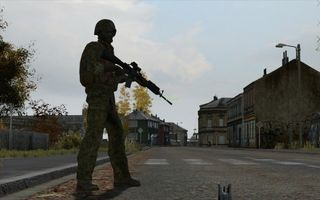
It's a huge package. The biggest game has 400km2 of island to explore. The most recent games have a huge number of real-world military weapons and vehicles, civilians and even animals. The islands vary in setting – dense Eastern European forests, cities, crumbling villages and foggy deserts are all there to patrol. It's a complete military toybox, using real places as the backdrop for fictional wars, in an ever-growing world the developers and fans refer to as the 'Armaverse'.
Dropping back into the first game is like slipping into a pair of wellworn army-surplus boots: the newer games are still built on some of the tech that powered OpFlash, hence the familiarity, even if the spectacle is somewhat muted.
I can still remember my first attempt to play OpFlash: the comforting muscle memory of every other shooter suffered a severe cramp when attempting the ridiculous finger contortions asked of me. Coming back to it now it's still tough: beyond the simple movement controls there are a series of nested menus – the calls and responses of military manoeuvres – right where you expect weapon selection to be. It's Bohemia's clumsy solution to their ambition: they want you to have lots of control over your soldier and his subordinates, to be able to order them around with a huge degree of freedom. They want you to be able to split squads into teams and individuals and send them all over the battlefield. But their game is also a shooter. Reconciling those two extremes has always been the series' biggest challenge, and it's still an uneasy balance.
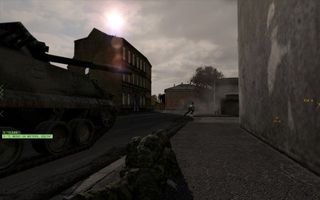
Soon I was running in the early morning sunlight, to my left and right a platoon of soldiers dashing across the undulating landscape. The world is a huge landmass of rolling hills in which Bohemia place missions: there's a day and night cycle, villages, roads. It allows for astonishingly open-ended action. Over the horizon, a full two minute's run away, is the enemy. I hear the warnings of chattering friendly soldiers before I'm able to make out the opposing force: miniscule, camouflaged figures against a brown background. Then a puff of smoke explodes from behind a tree and I realise they've got a tank.
We split up. One set of soldiers runs down the hill, using a treeline to keep separated from the enemy. My squad simply stays where it is, holding back from the fight, engaging from the high ground. It's my favourite bit of any Arma game: while the battle unfolds I get to watch all the systems interact from a cosy vantage point.
Another puff of smoke from the tank as the enemy notice my nearby soldiers. A tree collapses under its tracks as it heads towards them. Tiny flashes of gunfire from the supporting soldiers hundreds of metres away. It's all unscripted, generated according to the AI rules. I can't fathom how this could even have existed a decade ago. Even when the AI breaks, and I watch the tank grinding over the fallen tee, nose up, barely any forward movement, it's something to behold.
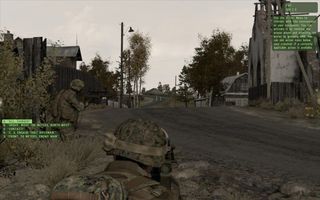
There are battles like this across all three games. Brutal, buggy slogs that put you in position, give you orders and tell you to get on with it. They range from single-man assaults on tank bases, and belly-down crawlfests where you lie yards away from patrols, holding your breath, to ground-jarring, PTA-inducing hell fights. You're dumped in tanks, planes and helicopters, or given a tank platoon to order about, in single- and multiplayer. The simulation scales to the challenge.
Given that it's a dynamic simulation, which creates its own outcomes – and that it's not playercentric, so an AI teammate could complete the objective – it's odd that Bohemia insist on providing us with a story. They funnel you through the world they've created, sometime giving you optional vignettes to take part in. The increasingly sophisticated way they do this, from Cold War Assault's fairly straightforward yomp to Arma 2's branching epic with its different paths and multiple outcomes, provides the clearest sense of the progression of the series.
There's also Arma 2's Armory: a multiplayer lobby set up like a tradeshow for military hardware. The players wander the grounds, inspect the hardware, then select items they like and vote on the scenario – attack or defend, etc. The game then takes all these elements, shuffles them like a deck of cards, and – tadaa, you have a mission incorporating them all.
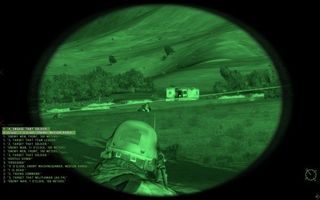
In the past I've been dropped into a fight against a tooled-up military helicopter armed with only a quadbike and a handgun. I've chased through the hot desert sun with a giggling Welshman on my tail. I've never known fear like it, and never been more amazed at a game's ability to accommodate player choice.
The Armory system will be used to generate missions that form part of the main story of Arma 3, the game building the story around you, but right now it's the easiest way of getting into the game for a quick tank vs sniper battle with friends.
It's a good starting point. Arma is best when played with other people, but finding an unmodded server and a place where newbies are gently walked through their tottering baby steps is getting harder by the day. You should persevere. Find your flavour of Arma and hunt down a group of players who will accept your clumsy attempt at playing soldiers, because you'll have moments where that inherent clumsiness won't matter. You'll be hooked up to Teamspeak, hiding behind a bush while a teammate, miles away, is watching you advance through binoculars reporting on enemy positions. You'll freeze, pinching your bladder as he shouts a panicked warning to stop, wait. As you lie there in the dirt, a tank will rumble by, and the pair of you will take deep, deep breaths. When it passes and you're free to move, you'll know why Arma is worth all the trouble.
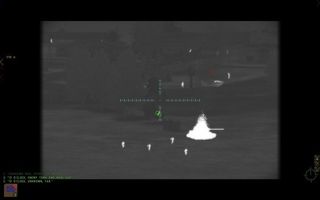
Is every game in the package worth playing? Arma 2 is certainly the best: the AI is generally smarter, making possible larger open battles than the original was capable of. They've also worked on the engine since launch: it ran at close to 20fps on the machine I originally reviewed it on, that same PC can now get 60fps.
Just that and the expansions justify the price. The basics remain the same, but each game in the series has its quirks and community. Arma is as much a platform for vehicle designing, world-building, soldier tweaking modders as it is a game. Buying the full package gives you access to ten year's worth of that community's work. A clunky as the original might seem, as middle-childish as Armed Assault feels, there are reams of mods, technical upgrades, new weapons and vehicles and more missions, for all the games.
There's a reason why Arma stands alone in what it does; it's because what it does is so ridiculous, so impossible and so clunky that copying it would be the road to ruin for anyone else. Codemasters tried and failed, and instead turned OpFlash into a linear shooter.
Arma is a soldier simulator that takes you from the lowliest grunt to a commander or a sky-troubling pilot. Is it tough to get into? More than any other game that has hooked me, and it has a habit of breaking quite spectacularly. But Arma is only complex because it does so much without compromise. It asks a lot of its players, but you'll get so much out of it in return.
A must-have collection for anyone looking for something more ambitious than just a military shooter.
